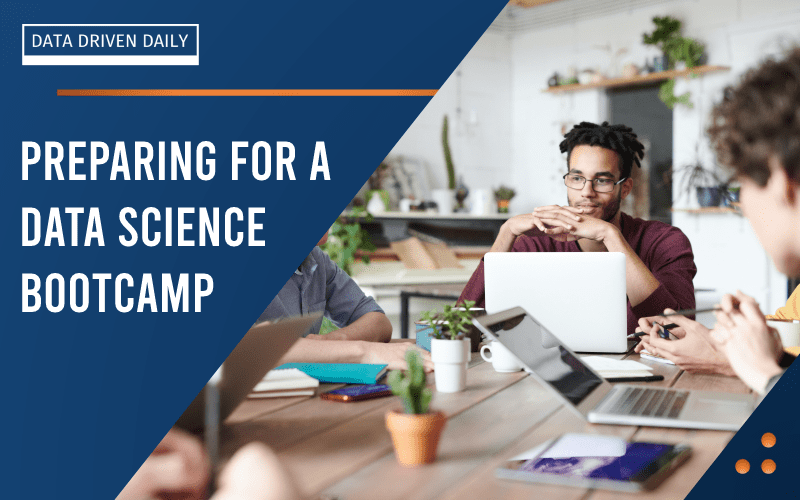Embarking on a data science bootcamp can be an exciting journey, but it’s crucial to arrive prepared.
To maximize your learning experience and ensure a smooth transition, it’s essential to build a strong foundation in the prerequisites and acquire relevant skills before starting the program.
In this post, we’ll guide you through the preparation process, so you’re ready to excel in your chosen data science bootcamp. For a list of the top data science bootcamps, visit our page on the Best Data Science Bootcamps.

Brush up on Mathematics and Statistics
A strong foundation in mathematics and statistics is crucial for understanding data science concepts. Focus on the following areas:
- Linear algebra: Learn the basics of matrices, vectors, and linear transformations.
- Calculus: Understand the fundamentals of differentiation and integration, as well as their applications in optimization and machine learning.
- Probability: Master basic probability theory, including probability distributions and Bayes’ theorem.
- Statistics: Familiarize yourself with descriptive and inferential statistics, hypothesis testing, and regression analysis.
Resources like Khan Academy, Coursera, and edX offer free courses on these topics, helping you build a solid mathematical foundation.
Learn Programming Fundamentals
Programming is a vital skill in data science, and most bootcamps require some level of programming proficiency. Focus on the following:
- Python or R: Python and R are the most popular programming languages for data science. Choose one to learn first, and familiarize yourself with its syntax and basic programming constructs. Python is generally recommended for beginners due to its versatility and readability.
- Data manipulation: Learn to work with data structures like arrays, lists, and data frames, as well as libraries such as Pandas (Python) or dplyr (R) for data manipulation.
- Version control: Familiarize yourself with Git and GitHub, as they are essential tools for collaborating on projects and managing code.
Numerous online resources, including Codecademy, DataCamp, and Udemy, offer courses on programming for data science.
Explore Data Visualization
Data visualization is essential for interpreting and presenting data insights. Gain proficiency in popular data visualization libraries:
- Python: Learn to use libraries like Matplotlib, Seaborn, and Plotly for creating static and interactive visualizations.
- R: Master the ggplot2 library for creating elegant and informative visualizations.
You can find tutorials and courses on data visualization through platforms like YouTube, Coursera, and DataCamp.
Get Familiar with Machine Learning Concepts
While most bootcamps will cover machine learning in detail, it’s helpful to have a basic understanding of the concepts beforehand. Start by learning about:
- Supervised and unsupervised learning: Understand the difference between these two types of machine learning and their common applications.
- Popular algorithms: Familiarize yourself with fundamental algorithms like linear regression, logistic regression, decision trees, and clustering methods.
- Model evaluation: Learn about metrics and techniques for evaluating the performance of machine learning models, such as accuracy, precision, recall, and cross-validation.
You can find introductory machine learning courses on platforms like Coursera, edX, and Google’s Machine Learning Crash Course.
Practice Your Skills with Projects
Hands-on experience is invaluable for reinforcing your learning and building a portfolio. Look for project ideas online or create your own, using real-world datasets from sources like Kaggle or UCI Machine Learning Repository. These projects will help you apply your skills, identify gaps in your knowledge, and showcase your abilities to future employers.
Conclusion
Proper preparation is crucial for success in a data science bootcamp. By investing time in building a strong foundation in mathematics, programming, data visualization, and machine learning, you’ll be better equipped to excel in your chosen program. Remember, practice makes perfect; working on projects and solving real-world problems will solidify your skills and boost your confidence.
Once you feel prepared, explore our Best Data Science Bootcamps post to find the ideal program for you. With the right preparation and dedication, you’ll be well on your way to a rewarding career in data science.
Ben is a full-time data leadership professional and a part-time blogger.
When he’s not writing articles for Data Driven Daily, Ben is a Head of Data Strategy at a large financial institution.
He has over 14 years’ experience in Banking and Financial Services, during which he has led large data engineering and business intelligence teams, managed cloud migration programs, and spearheaded regulatory change initiatives.